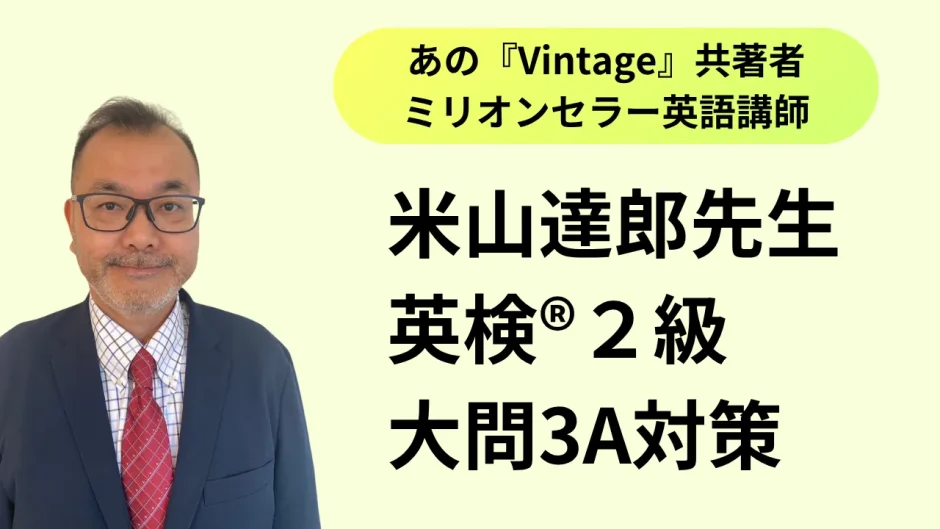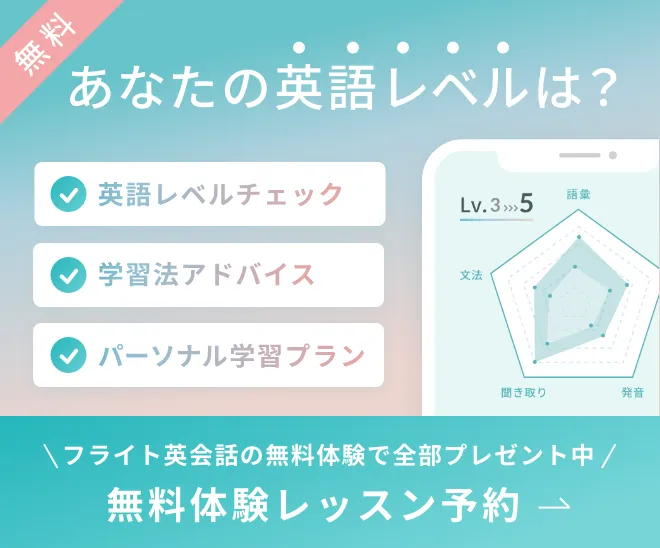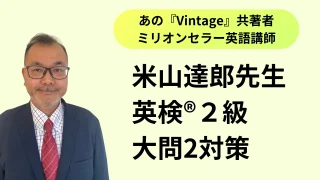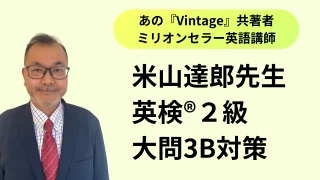本ページはPRが含まれています。
みなさんこんにちは、米山達郎(よねやま・たつろう)です。

米山 達郎よねやま たつろう
京都大学の文学部を卒業してから、長い間、河合塾で模擬試験を作るリーダーをしていました。現在は、資格試験や大学入試の問題を作ったり、学校の先生たちのサポートをしたりしています。これまでに作った本には、『英文法・語法 Vintage』(いいずな書店)、『英作文バイブル和文英訳編/自由英作文編』(Z会)、『パラグラフリィーディングのストラテジー1/2/3』(河合出版)などがあります(いずれも共著です)。
📘 詳しいプロフィール・著書情報はこちら → 米山達郎先生プロフィール
私はふだん、大学入試や英検®、TOEICなどのテストを作る仕事をしています。このブログでは、英検®2級の問題を見ながら、「英検®2級ではこういう問題が出ている」「こんなスキルが必要とされる」ということを、わかりやすく伝えていきます。
ちょうど文化人類学者がある村に行って、その村の暮らしを観察して「この村にはこんな文化がありますよ」と紹介するように、私は英検®2級という「世界」をみなさんに紹介する気持ちで書いています。
このブログを読むことで、「英検®2級ってこんな感じなんだ」「こうやって勉強したらいいんだな」と実感してもらえたらうれしいです。
なお、ブログに出てくる問題はすべてオリジナルで、実際の過去問ではありません。英検®の過去問を見たい方は、こちらをご覧ください:
■英語学習にお悩みの方へ!ぜひプロにご相談ください!
>PHLIGHT英会話の無料体験:英会話相談・レベルチェックレッスンができるのはこちら
目次
メール読解問題(大問3A (24)〜(26))
1) どんな問題が出ているの?
大問3Aの(24)〜(26)はメールの英文を読んで、その内容について設問に答える問題です。
メールの文面はだいたい200 words程度です。
2) どうやって解けばいいの?
まず、基本的な「本文の読み方」と「設問の解き方」を確認しておきます。
【ステップ1】本文の内容を大まかにとらえる
メールの内容をすべて精読する必要はありません。最初は、どんな内容なのかざっくりつかむだけで大丈夫です。具体的には、パラグラフごとに、「このパラグラフでは何のことを言ってるいのか?」を短くまとめるやり方が効果的です。
例えば、
- ¶1 予定の話
- ¶2 会う時間や場所の提案
- ¶3 連絡方法の確認
という感じです。こうやって読むと、内容がすっきり整理できますね。
↓
【ステップ2】設問を読んで、答えのヒントを探す
次に、設問を読んで、「この設問の答はどのメールのどのあたりにあったかな?」と関係ありそうな部分に戻って、そこだけはきちんと読んで内容を理解します。
ただし、大問3Aでは各パラグラフからそれぞれ順番に設問を作っているので、「¶1を読んで問1を解く→¶2を読んで問2を解く→¶3を読んで問3を解く」というやり方で解く方が実践的と言えます。
↓
【ステップ3】本文と選択肢をくらべる
選択肢とメール本文で、使っている単語がまったく同じとは限りません。表現が微妙に異なっていても、言っている内容がほぼ同じならそれが「正解」になります。このような、本文と選択肢の「言いかえ(パラフレーズ)」には十分に気をつけましょう。
3) 実際にやってみよう!
それでは、オリジナル問題にチャレンジしましょう。
制限時間3分で解いてみてください。
次のEメールの内容に関して,(24)から(26)までの質問に対する答として最も適切なもの,または文を完成させるのに最も適切なものを1,2,3,4の中から一つ選び,その番号のマーク欄をぬりつぶしなさい。
From: Emily Chen <e.chen@hillviewlibrary.org>
To: Marcus Lee <mlee234@studyzone.net>
Date: April 15
Subject: Volunteer Opportunity
—————————————————————————————————–
Dear Marcus,
Thank you for showing interest in volunteering at Hillview Public Library. We’re happy to let you know that we’re planning a special event called “Reading Week” next month, and we would love your help. The event will include storytime for children, book discussions for teens, and workshops for adults. Volunteers like you are essential to making the event a success.
We are currently looking for people to help guide visitors, prepare reading materials, and support the guest speakers. As a volunteer, you will also receive a certificate of appreciation at the end of the event. If you’re available on any day between May 10 and May 14, please let us know by replying to this email by April 30. We will send you a detailed schedule once we hear from you.
In addition, the library is launching a new monthly newsletter starting in June. If you’d like to help write book reviews or share your own reading experiences, let us know.
The newsletter will be available both online and in print, so many visitors will have a chance to read it. It’s a great chance to improve your writing and contribute to the library community.
Sincerely,
Emily Chen
Volunteer Coordinator
(24) What is one reason Marcus is receiving this e-mail?
1 To invite him to take part in a library event designed for people of all ages.
2 To suggest that he organize a reading contest for local students.
3 To inform him about changes to the library’s operating hours.
4 To offer him a full-time job during the next holiday season.
(25) What does Marcus need to do by April 30?
1 Let the library know which tasks he prefers to do during the event.
2 Let the library know which days he can help during the event period.
3 Choose a time to meet the guest speakers before the event.
4 Write a short message to thank the library for the opportunity.
(26) What is one way Marcus can get involved with the new library newsletter?
1 By offering feedback on the design of the first issue.
2 By reporting on local news for the library staff.
3 By contributing reviews or personal reflections about books.
4 By managing the newsletter’s email distribution list.
〈語句リスト〉
- show interest in A Aに興味を示す
- volunteer ボランティア、奉仕活動をする人
- public library 公共図書館
- storytime 読み聞かせの時間
- essential 不可欠な、重要な
- reading materials 読書資料
- certificate of appreciation 感謝状
- available 都合がつく、利用できる
- reply to A A(メール)に返信する
- detailed 詳細な
- launch A A(活動)を始める、立ち上げる
- book reviews 書評
- online and in print オンラインと印刷版で
- contribute to A Aに貢献する
- improve one’s writing 文章力を高める
それでは解説です。
ここではパラグラフ毎に設問を解説していきます。
¶1 ①Thank you for showing interest in volunteering at Hillview Public Library.
②We’re happy to let you know that we’re planning a special event called “Reading Week” next month, and we would love your help. ③The event will include storytime for children, book discussions for teens, and workshops for adults. ④Volunteers like you are essential to making the event a success.
(①ヒルビュー公共図書館でのボランティア活動に興味を持ってくれてありがとうございます。②来月、「リーディング・ウィーク」という特別イベントを開催する予定で、あなたの協力をぜひお願いしたいと思っています。③このイベントでは、子ども向けのおはなし会、ティーン向けの読書会、大人向けのワークショップが行われます。④あなたのようなボランティアの力が、イベント成功のカギとなります。)
(24) What is one reason Marcus is receiving this e-mail?
(マーカスがこのメールを受け取った理由の1つは何ですか?)
☞まず②We’re happy to let you know that we’re planning a special event called “Reading Week” next month, and we would love your help.(来月、「リーディング・ウィーク」という特別イベントを開催する予定で、あなたの協力をぜひお願いしたいと思っています)より、マーカスにイベントに参加してほしい(=招待)という目的が明確です。
次に③The event will include storytime for children, book discussions for teens, and workshops for adults.(このイベントでは、子ども向けのおはなし会、ティーン向けの読書会、大人向けのワークショップが行われます)より、「子ども・ティーン・大人向け」というさまざまな年代向けの内容なので、people of all ages(すべての年代の人々)と言い換えられます。
よって、1 To invite him to take part in a library event designed for people of all ages. (すべての年代の人々を対象とした図書館イベントに参加するよう彼を招待するため)が正解。
¶2 ①We are currently looking for people to help guide visitors, prepare reading materials, and support the guest speakers. ②As a volunteer, you will also receive a certificate of appreciation at the end of the event. ③If you’re available on any day between May 10 and May 14, please let us know by replying to this email by April 30. ④We will send you a detailed schedule once we hear from you.
(①現在、来場者の案内、読書資料の準備、ゲストスピーカーのサポートを手伝ってくれる人を探しています。②ボランティアとして参加してくださった方には、イベント終了後に感謝状をお渡しします。③もし5月10日から14日のいずれかの日に参加できるようでしたら、4月30日までにこのメールに返信してください。④お返事をいただき次第、詳細なスケジュールをお送りします。)
(25) What does Marcus need to do by April 30?
(Marcus が4月30日までにしなければならないことは何ですか?)
☞③If you’re available on any day between May 10 and May 14, please let us know by replying to this email by April 30.(もし5月10日から14日のいずれかの日に参加できるようでしたら、4月30日までにこのメールに返信してください)に注目。マーカスがすることは、「どの日に参加できるかを伝える」ことです。よって2 Let the library know which days he can help during the event period.(イベント期間中のどの日に手伝えるかを図書館に知らせること)が正解。本文のany day between May 10 and May 14から選択肢のwhich daysへの言い換えも確認しておこう。
¶3 ①In addition, the library is launching a new monthly newsletter starting in June.
②If you’d like to help write book reviews or share your own reading experiences, let us know.
③The newsletter will be available both online and in print, so many visitors will have a chance to read it. ④It’s a great chance to improve your writing and contribute to the library community.
(①さらに、図書館では6月から月刊のニュースレターを始める予定です。②もし書評を書いたり、自分の読書体験を共有したい場合は、ぜひお知らせください。③このニュースレターはオンラインと印刷版の両方で提供され、多くの来館者に読まれる予定です。④文章力を高め、図書館コミュニティに貢献できる素晴らしい機会です。)
(26) What is one way Marcus can get involved with the new library newsletter?
(Marcus が図書館の新しいニュースレターに関わる方法の1つは何ですか?)
☞②If you’d like to help write book reviews or share your own reading experiences, let us know.(もし書評を書いたり、自分の読書体験を共有したい場合は、ぜひお知らせください。)より、3 By contributing reviews or personal reflections about books.(書評や本についての個人的な感想を寄稿することによって)が正解。本文のwrite book reviews(書評を書く)とshare your own reading experiences(読書体験を共有する)は、選択肢3のreviews(書評)やpersonal reflections(個人的な感想)に内容がぴったり一致していますね。
まとめ:メール読解問題の学習対策
次の3点に気をつけて、過去問や類似問題を解いていきましょう。
1) メールの特徴を意識しよう
メールは「人と人との会話のやりとり」がベースになっています。ですから、
- 誰が誰に書いたのか(送信者・受信者)
- 何のために書いたのか(用件・目的)
この2つをまずはしっかりつかむのが大切です。
2) 5W1H(いつ・どこで・誰が・何を・どう・なぜ)を意識しよう
Eメールでは次のような質問がよく出ます。
- When(いつ) 予定、日時の変更など
- Where(どこで) 会場、集合場所など
- Who(誰が) 登場人物、関係者
- What(何を) 用件、お願い、イベント内容など
- How(どうやって) 方法、持ち物、連絡手段など
- Why(なぜ) 理由、目的など
メールの内容を読み取る際に、このような5W1Hの情報を整理することが大切です。
3) 練習のときは「自分の言葉で説明する」力もつけよう
メール読解の練習では、問題を解いて終わりにせずに、メール全体とパラグラフ単位の内容を自分の言葉で日本語にまとめてみるのがおすすめです。たとえば、「このメールの用件は予定変更の連絡」「このパラグラフは、集合時間の確認。次のパラグラフは、イベントの参加についての返事の催促」…こんなふうにメールのやりとりの目的やポイントを整理すると、内容をすばやく正確に読み取る力(読解力・読解センス)がグンとアップします。「誰が・誰に・何のために」書いたメールなのかを、自分の言葉でまとめることがポイントです。

この練習を重ねれば、内容をパッとつかめるようになりますよ!
※英検®は、公益財団法人 日本英語検定協会の登録商標です。このコンテンツは、公益財団法人 日本英語検定協会の承認や推奨、その他の検討を受けたものではありません。
「最短」で英語を話せるようになるには?
英語を話せるようにはなりたい。でも、、、
- 何から始めたらいいのかわからない
- どの教材を使えばいいのかわからない
- まとまった時間が取れなくて勉強が進まない
- 英語力0なので自分にできるのか自信がない
このようなお悩みを抱える英語初心者の方は多いのではないでしょうか。
効率よく英語力を伸ばすには、セオリーがあります。今の英語力、目的、目標レベルを明確にして、継続的に取り組んでいくことが大切です。ぜひ、情報をしっかりとチェックして、あなた専用の学習プランを作成してください。
とはいえ、情報量も多く、どのように計画を立てればよいか悩まれる方も多いと思います。そんなときは、ぜひ「プロ」にご相談ください。PHLIGHT英会話では、無料体験レッスンで、英会話の学習相談や、英語レベルチェックを行っています。最短で英語を話せるようになるためのパーソナル学習プランもご提案しますので、ぜひお気軽にご相談ください。
■英語学習にお悩みの方へ!ぜひプロにご相談ください!
>PHLIGHT英会話の無料体験:英会話相談・レベルチェックレッスンができるのはこちら






